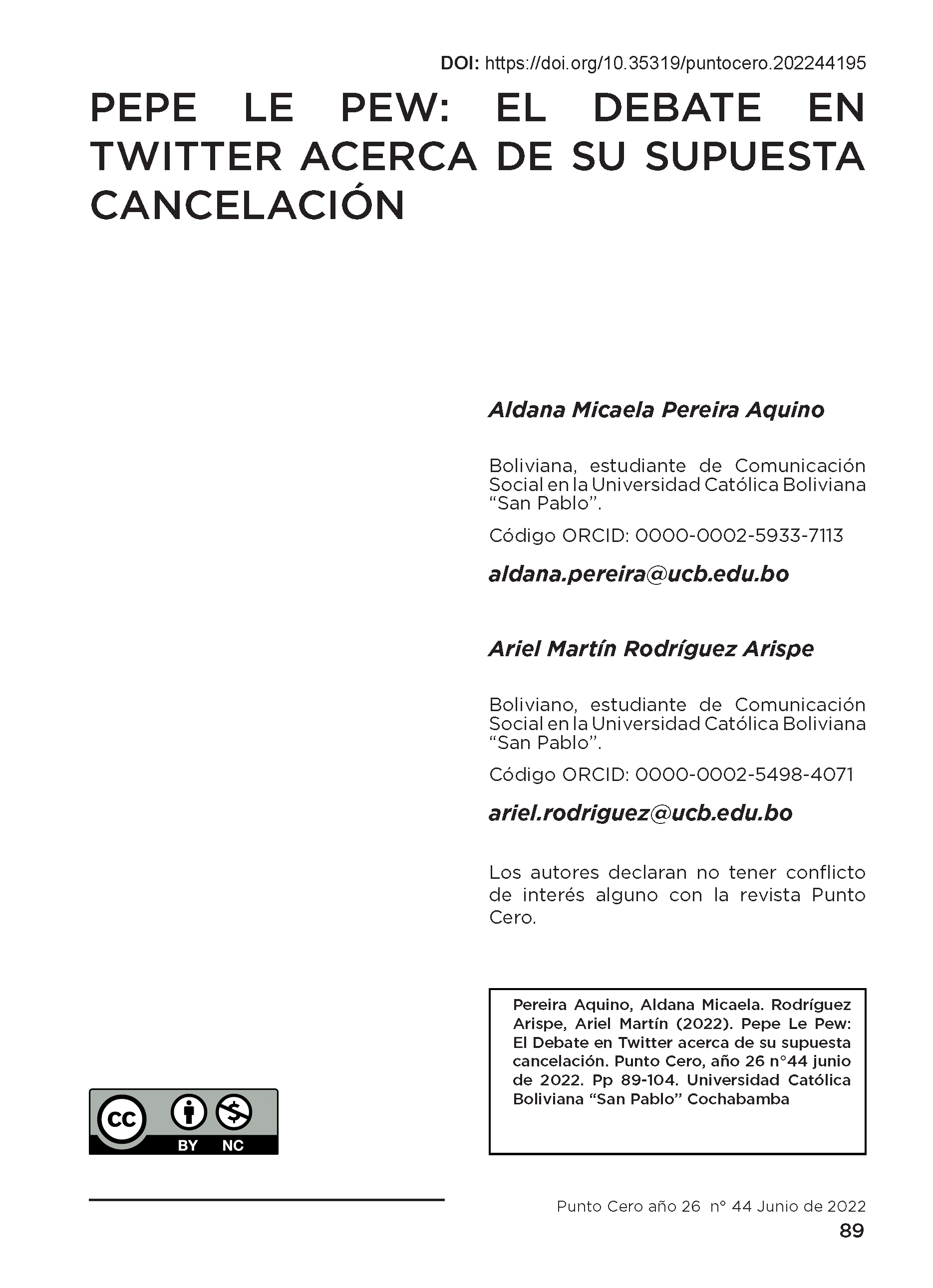Pepe Le Pew: The debate on Twitter about its supposed cancellation
DOI:
https://doi.org/10.35319/puntocero.202244195Keywords:
Cancel Culture, Social Networks, Cultural Industry, Discussion, CyberspaceAbstract
This article aims to explain how the cancellation culture debate developed in the case of Pepe Le Pew on Twitter through the analysis of the content of the tweets on the subject, the classi- fication of interactions between users and the identification of their profi- les according to their position in the debate. For this, the content analy- sis technique was used along with non-participant observation. Through this analysis it was possible to identify that most of the content of the debate were against the cancellation of Pepe, but proposed to cancel other charac- ters, groups or content, thus creating a cancellation of the cancellation. In turn, the interactions were based on defending this position, excluding or attacking different perspectives. Also, it was shown that the majority of users maintained a certain degree of anon- ymity and that the role of the media made the debate controversial by pointing out a supposed cancellation.
References
Blow, C. (2021a). Perfil a favor. https://mobile.twitter.com/CharlesMBlow%0A
Blow, C. (2021b). Tweet Pepe Le Pew. https://mobile.twitter.com/CharlesMBlow/status/1368200161558663168
Blow, C. (2021c, March 3). Six Seuss Books Bore a Bias. New York Times. https://www.nytimes.com/2021/03/03/opinion/suess-books-race-bias.html
Brovelli, F. (2020). Cultura de la cancelación. Experiencias de escraches contemporáneas en la literatura argentina. Actas de Periodismo y Comunicación, 6. http://perio.unlp.edu.ar/ojs/index.php/actas
Burgos, E., & Hernández, G. (2021). La cultura de la cancelación: ¿autoritarismo de las comunidades de usuario? Comunicación: Estudios Venezolanos de Comunicación. https://comunicacion.gumilla.org/wp-content/uploads/2021/04/COM_2021_193_143-155.pdf
Cartoonito. (2018). El caso de Pepe Le Pew | ¡Nuevo episodio! | New Looney Tunes | Boomerang. https://www.youtube.com/watch?v=gO1Uuu0ChPY&ab_channel=CartoonitoenEspañol
Delgado, J. C. (2020, July 10). ¿Qué es la «cultura de la cancelación? La práctica de moda en la ultraizquierda. ABC Cultura. https://www.abc.es/cultura/abci-cultura-cancelacion-practica-moda-ultraizquierda-202007101339_noticia.html
Fandom, L. T. (n.d.). Pepé Le Pew. https://looneytunes.fandom.com/es/wiki/Pepé_Le_Pew
García, A. (2011). Definición del alcance de la investigación a realizar: exploratoria, descriptiva, correlacional oexplicativa. https://sites.google.com/site/metodologiadelainvestigacionb7/capitulo-5-sampieri
Guardia, M. (n.d.). La investigación en Procesos Interactivos Cochabamba. Universidad Católica Boliviana “San Pablo,” 17–99.
Horkheimer, M., & Adorno, T. (1988). La industria cultural. Iluminismo como mistificación de masas . In Dialéctica del iluminismo (pp. 133–182). Sudamericana.
Levy, P. (2007). CIENCIA, TECNOLOGÍA Y SOCIEDAD 16 • ANTtiROPOS A!l UNIVERSIDAD AUTONOMA METROPOlITANA. http://www.anthropos-editorial.com
Miranda Bustamante, M., & Fernández Medina,F.(2015).Hablándolealatelevisión: análisis de las conexiones discursivas entre Twitter y tres programas de contenido político en televisión abierta. Comunicación y Sociedad, 24, 71–94.
Ojeda, A., & Peredo, V. (2018). Microdinámicas De Opinión Alrededor Del Hashtag #Rayoevolizador En Twitter. Punto Cero, 23(37), 29–39.
Pertíñez, J., & Hidalgo, M. C. (2008). Educación estética en animación televisiva. Comunicar, 16(31), 751–756. https://doi.org/10.3916/c31-2008-03-077 DOI: https://doi.org/10.3916/c31-2008-03-077
Phillips, P. L. A., & Alemán, A. A. (2019). #Golpedeestado Y #Fraudeenbolivia: Un Análisis De Las Comunidades Digitales En La Crisis Del 20/O. Punto Cero, 24(39), 51–61. http://www.scielo.org.bo/scielo.php?script=sci_arttext&pid=S1815-02762019000200004&lng=es&nrm=iso DOI: https://doi.org/10.35319/puntocero.20193923
Rodríguez-Suárez, J., Morán-Neches, L., & Herrero-Olaizola, J. B. (2021). Investigación en red, nuevos lenguajes y simbologías del activismo digital: Una revisión sistemática. Comunicar, 29(68), 1–11. https://doi.org/10.3916/C68-2021-04 DOI: https://doi.org/10.3916/C68-2021-04
Scolari, C. (2008). Hipermediaciones: elementos para una teoría de la comunicación digital interactiva. Gedisa.
Simons, G. (2021). ROLE OF SOCIAL MEDIA IN AMPLIFYING NEO-LIBERAL. December. https://www.researchgate.net/publication/356836029_ROLE_OF_SOCIAL_MEDIA_IN_AMPLIFYING_NEO-LIBERAL_CANCEL_CULTURE
Usuario.11. (2021). Tweet de crítica a personajes reales. https://mobile.twitter.com/JLozanoA/status/1371208499972210688
Usuario.27. (2021). Tweet neutro. https://mobile.twitter.com/soy_502/status/1369000774060085257
Usuario.47. (2021). Tweet Defensa Pepe Le Pew. https://mobile.twitter.com/Bruce_wayne_67/status/1368693566910984193
Usuario.57. (2021). Tweet de crítica a personajes femeninos. https://mobile.twitter.com/luisangelcarr/status/1368655542294609921
Usuario.60. (2021). Tweet de crítica al feminismo. https://mobile.twitter.com/IAmParalyzer/status/1368653961587220480

Downloads
Published
How to Cite
Issue
Section
License
Copyright (c) 2022 Revista Punto Cero

This work is licensed under a Creative Commons Attribution-NonCommercial 4.0 International License.








